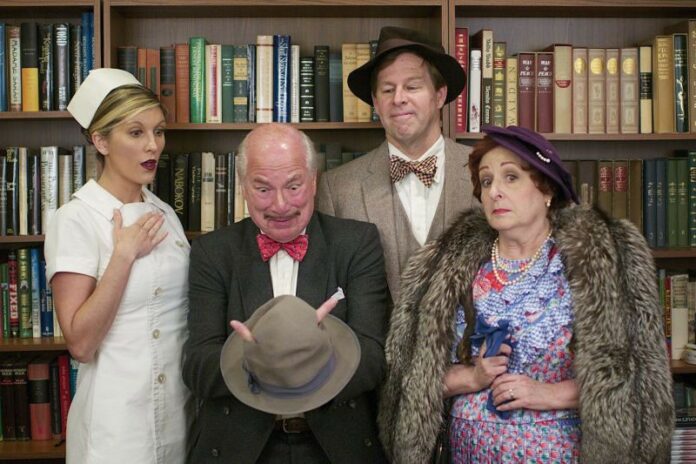Harvey is one of those plays that almost everyone has heard of but few have actually seen.
The gentle little comedy by American playwright Mary Chase debuted in 1944, and ended up running on Broadway for five years. The story of an amiable alcoholic who claims to have a six-foot invisible rabbit as a best friend, Harvey won the Pulitzer for drama in 1945, and five years later was made into an Oscar-winning film starring Jimmy Stewart. It is that version most people have stumbled across, with Stewart’s indelible portrayal of Elwood Dowd that’s become a pop-culture icon of nonconformist optimism and genial human kindness.
But it all started with the play, which the Ross Valley Players are currently staging in a production that shows why audiences were so taken with Harvey seven decades ago. Steve Price gives an uncannily spot-on imitation of James Stewart’s vocal timbre and steady-soft acting style, while still bringing a bit of his own interpretation to the role of Elwood. He’s the kind of guy who likes everybody, casually inviting cab drivers and telephone marketers over for dinner, the sort who loves nothing more than hanging out in bars with his invisible friend, enjoying the company of his fellow human beings.
So of course his family wants him committed to an asylum. His status-seeking sister, Veta (Pamela Chiochetti), is still angry that her father left his house and fortune to Elwood, whose rabbit fixation has made her family a bit of a joke in social circles. Only by having him committed—and out of the way of her attempts to marry off her daughter, Myrtle Mae (Robyn Grahn)—can she gain control of the fortune and her freedom from Harvey, whom she admits she occasionally sees herself.
A series of misunderstandings at the local asylum, where the doctors claim to be able to cure anyone of delusions with a single shot of a mystery drug, leads to Veta being accidentally admitted herself, while Elwood loses track of Harvey, who, invisible or not, delusion or not, clearly has some sort of agenda of his own.
Under Robert Wilson’s unfussy but pace-challenged direction, the charming, old-fashioned story is brought to (mostly) satisfying life by a cast of community theater favorites and a few RVP newcomers. Though I wish the tone were a little more grounded and a bit less cartoonish and high-pitched, the story still works, bringing Harvey to life in all his invisible, amiably subversive glory.
Rating (out of 5): ★★★









